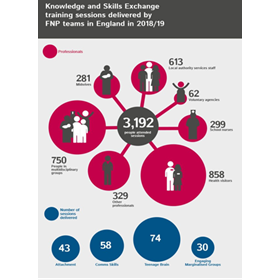Knowledge and Skills Exchange – sharing FNP learning, knowledge and evidence with other services
Peter Senge, who developed the concept of the “learning organisation”, once said:
“Sharing knowledge is not about giving people something, or getting something from them. Sharing knowledge occurs when people are genuinely interested in helping one another develop new capacities for action; it is about creating learning processes.”
I believe passionately that learning is at the heart of change, progress and improvement. That’s why in FNP we have worked hard to develop an excellent, transformative learning programme for family nurses. It’s why we try to be honest about our failures, as well as our successes, and seek to learn from them. It’s why local teams use extensive data to inform and to challenge practice on a daily basis. It’s why FNP clinical practice focuses on building capacity collaboratively with clients as they learn to care well for themselves and their babies.
Good learning is also about sharing, trust and vulnerability – learning from each other, challenging pre-conceptions, trying things out (and getting them wrong) and getting feedback. And it's about time, care and space: taking the time to deepen and embed skills and knowledge and being thoughtful about how to construct a learning experience.
All this inspired our approach to developing Knowledge and Skills Exchange packages a couple of years ago. FNP is built on over 35 years of extensive international research. It is underpinned by robust theories and it has been rigorously tested, adapted and developed to ensure that benefits can be seen and felt in the lives of clients and their families in the short and long term. We wanted to share what we could of this with other services; and we were being asked to do so, often.
The potential benefits are obvious. It offers a way to deepen common understanding, language and values across systems, and to introduce different perspectives and challenge thinking. Of course it also speaks to the need to offer value for money and equity – extending the value of having an FNP team in an area and benefiting other vulnerable groups.
However, there are real challenges. Is it possible to cherry pick parts of a well-integrated and structured intervention and apply them elsewhere? Can it be done without the surrounding scaffolding of supervision, a rich body of supporting practice and regular, ongoing contact with clients over two years? What about the licence?
Knowledge and Skills Exchange represents our first steps to developing a wider learning community. We offer four stand-alone training sessions which family nurses lead for others working in the early intervention field locally. They do not use licensed materials but harness the common theories and knowledge underpinning FNP practice and skills development. They help enable a common and consistent approach and they create a forum for groups (and for us) to learn from each other’s practice, as well as from FNP experience.
We’re thrilled that they are being well received and, as time has gone on, a momentum has built. During a nine month period, from April to December 2018, local FNP teams have trained over 2,560 healthcare professionals in the four areas: attachment, communications skills (building on motivational interviewing principles), the teenage brain and engaging marginalised groups.
Julia Dymock, a family nurse in Dudley, says:
‘We have delivered sessions on ‘The Teenage Brain’ to over 170 professionals: social workers, foster carers, Children Home staff, Speech and Language staff, Health visitors, and we believe spreading such important knowledge and skills can have a real long-term impact within the Dudley Borough workforces. Client-centred approaches, and positive attitudes to young people, can make services more effective and acceptable to the young people we, as a healthcare community are all working with.’
While a manager of a Children in Care team commented:
‘It was so useful to learn about how the brain develops and which part develop at different stages/ages and I really liked the additional tools that were used. As a result of the training, I will use more open questions and remember the impact of brain development on teenage behaviour.’
So, what next? We’re looking at our data carefully to think about how we should develop and improve the offer, and we are also seeking feedback about what other Knowledge and Skills Exchange packages we might develop. We’ve been surprised about which packages have been most popular – for example, the take up of the learning on the teenage brain is significantly higher than other packages. We are still concerned about how to embed deep and continued learning in a context when many professionals have little time to reflect, think or develop. But we’re heartened by the current national interest in growing capacity to work in the first 1,000 days of life, and we want to help develop a collaborative, consistent approach that harnesses the strengths of the many experienced organisations working in the sector – playing our part in growing capacity and creating a community of excellence.
More information on Knowledge and Skills Exchange Packages can be found here.
